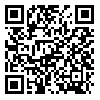Mon, Dec 23, 2024
[Archive]
Volume 7, Issue 3 (September 2011)
IJEEE 2011, 7(3): 149-160 |
Back to browse issues page
Download citation:
BibTeX | RIS | EndNote | Medlars | ProCite | Reference Manager | RefWorks
Send citation to:



BibTeX | RIS | EndNote | Medlars | ProCite | Reference Manager | RefWorks
Send citation to:
Shaerbaf S, Seyedin S A R. Nonlinear Multiuser Receiver for Optimized Chaos-Based DS-CDMA Systems . IJEEE 2011; 7 (3) :149-160
URL: http://ijeee.iust.ac.ir/article-1-383-en.html
URL: http://ijeee.iust.ac.ir/article-1-383-en.html
Abstract: (8236 Views)
Chaos based communications have drawn increasing attention over the past years. Chaotic signals are derived from non-linear dynamic systems. They are aperiodic, broadband and deterministic signals that appear random in the time domain. Because of these properties, chaotic signals have been proposed to generate spreading sequences for wide-band secure communication recently. Like conventional DS-CDMA systems, chaos-based CDMA systems suffer from multi-user interference (MUI) due to other users transmitting in the cell. In this paper, we propose a novel method based on radial basis function (RBF) for both blind and non-blind multiuser detection in chaos-based DS-CDMA systems. We also propose a new method for optimizing generation of binary chaotic sequences using Genetic Algorithm. Simulation results show that our proposed nonlinear receiver with optimized chaotic sequences outperforms in comparison to other conventional detectors such as a single-user detector, decorrelating detector and minimum mean square error detector, particularly for under-loaded CDMA condition, which the number of active users is less than processing gain.
Type of Study: Research Paper |
Subject:
Spread Spectrum
Received: 2011/04/03 | Revised: 2011/12/24 | Accepted: 2011/08/15
Received: 2011/04/03 | Revised: 2011/12/24 | Accepted: 2011/08/15
| Rights and permissions | |
 |
This work is licensed under a Creative Commons Attribution-NonCommercial 4.0 International License. |







